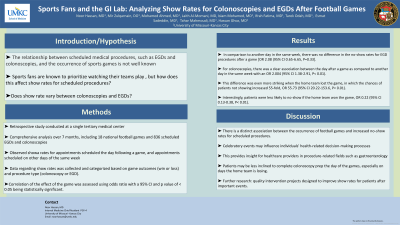Tuesday Poster Session
Category: General Endoscopy
P4095 - Sports Fans and the GI Lab: Analyzing Show Rates for Colonoscopies and EGDs After Football Games
Tuesday, October 29, 2024
10:30 AM - 4:00 PM ET
Location: Exhibit Hall E

Has Audio

Noor Hassan, MD
University of Missouri Kansas City School of Medicine
Kansas City, MO
Presenting Author(s)
Noor Hassan, MD1, Mir Zulqarnain, DO2, Mohamed Ahmed, MD, MSc2, Laith Al Momani, MD3, Islam Mohamed, MD4, Ifrah Fatima, MD2, Tarek Odah, MD5, Esmat Sadeddin, MD2, Tahar M. Mahmoudi, MD2, Hassan Ghoz, MD2
1University of Missouri Kansas City School of Medicine, Kansas City, MO; 2University of Missouri - Kansas City School of Medicine, Kansas City, MO; 3Saint Luke's Health System of Kansas City, Kansas City, MO; 4University of Missouri, Columbia, MO; 5Mayo Clinic Health System, Jacksonville, FL
Introduction: This study explores the intriguing relationship between scheduled medical procedures, specifically colonoscopies and esophagogastroduodenoscopies (EGDs), and the occurrence of football games. This investigation aims to shed light on the impact of celebratory events on patient attendance for essential health screenings.
Methods: This retrospective study was conducted in a single tertiary medical center in Kansas City, Missouri. A comprehensive analysis was conducted over seven months and included 18 national football games and 836 scheduled colonoscopies and EGDs. The study focused on two scenarios: appointments scheduled the day following or the day of games and appointments scheduled on other days of the same week. Data regarding show rates was collected and categorized based on game outcomes (win or loss) and procedure type (colonoscopy or EGD). Correlation of the effect of the game was assessed using odds ratio with a 95% CI and a p value of < 0.05 being statistically significant.
Results: In comparison to another day in the same week, there was no difference in the no-show rates for EGD procedures after a game [OR 2.08 (95% CI 0.65-6.65, P=0.33]. However, for colonoscopies, there was a clear association between the day after a game as compared to another day in the same week with an OR 2.004 (95% CI 1.38-2.91, P< 0.01). This difference was even more striking when the home team lost the game, in which the chances of patients not showing increased 55-fold, OR 55.73 (95% CI 20.22-153.6, P< 0.01). Interestingly, patients were less likely to no-show if the home team won the game, OR 0.22 (95% CI 0.13-0.38, P< 0.01).
Discussion: Our findings underscore a distinct association between the occurrence of football games and increased no-show rates for scheduled procedures. The pronounced difference in attendance suggests that celebratory events, such as football games, may influence individuals' health-related decision-making processes, potentially diverting attention away from essential medical appointments. Recognizing this pattern provides valuable insight for healthcare providers in procedure-related fields such as gastroenterology. Additionally, our research suggests that patients may be less inclined to complete colonoscopy prep the day of the games, especially on days the home team is losing. Further research could include quality intervention projects designed to improve show rates for patients after important events.
Disclosures:
Noor Hassan, MD1, Mir Zulqarnain, DO2, Mohamed Ahmed, MD, MSc2, Laith Al Momani, MD3, Islam Mohamed, MD4, Ifrah Fatima, MD2, Tarek Odah, MD5, Esmat Sadeddin, MD2, Tahar M. Mahmoudi, MD2, Hassan Ghoz, MD2. P4095 - Sports Fans and the GI Lab: Analyzing Show Rates for Colonoscopies and EGDs After Football Games, ACG 2024 Annual Scientific Meeting Abstracts. Philadelphia, PA: American College of Gastroenterology.
1University of Missouri Kansas City School of Medicine, Kansas City, MO; 2University of Missouri - Kansas City School of Medicine, Kansas City, MO; 3Saint Luke's Health System of Kansas City, Kansas City, MO; 4University of Missouri, Columbia, MO; 5Mayo Clinic Health System, Jacksonville, FL
Introduction: This study explores the intriguing relationship between scheduled medical procedures, specifically colonoscopies and esophagogastroduodenoscopies (EGDs), and the occurrence of football games. This investigation aims to shed light on the impact of celebratory events on patient attendance for essential health screenings.
Methods: This retrospective study was conducted in a single tertiary medical center in Kansas City, Missouri. A comprehensive analysis was conducted over seven months and included 18 national football games and 836 scheduled colonoscopies and EGDs. The study focused on two scenarios: appointments scheduled the day following or the day of games and appointments scheduled on other days of the same week. Data regarding show rates was collected and categorized based on game outcomes (win or loss) and procedure type (colonoscopy or EGD). Correlation of the effect of the game was assessed using odds ratio with a 95% CI and a p value of < 0.05 being statistically significant.
Results: In comparison to another day in the same week, there was no difference in the no-show rates for EGD procedures after a game [OR 2.08 (95% CI 0.65-6.65, P=0.33]. However, for colonoscopies, there was a clear association between the day after a game as compared to another day in the same week with an OR 2.004 (95% CI 1.38-2.91, P< 0.01). This difference was even more striking when the home team lost the game, in which the chances of patients not showing increased 55-fold, OR 55.73 (95% CI 20.22-153.6, P< 0.01). Interestingly, patients were less likely to no-show if the home team won the game, OR 0.22 (95% CI 0.13-0.38, P< 0.01).
Discussion: Our findings underscore a distinct association between the occurrence of football games and increased no-show rates for scheduled procedures. The pronounced difference in attendance suggests that celebratory events, such as football games, may influence individuals' health-related decision-making processes, potentially diverting attention away from essential medical appointments. Recognizing this pattern provides valuable insight for healthcare providers in procedure-related fields such as gastroenterology. Additionally, our research suggests that patients may be less inclined to complete colonoscopy prep the day of the games, especially on days the home team is losing. Further research could include quality intervention projects designed to improve show rates for patients after important events.
Disclosures:
Noor Hassan indicated no relevant financial relationships.
Mir Zulqarnain indicated no relevant financial relationships.
Mohamed Ahmed indicated no relevant financial relationships.
Laith Al Momani indicated no relevant financial relationships.
Islam Mohamed indicated no relevant financial relationships.
Ifrah Fatima indicated no relevant financial relationships.
Tarek Odah indicated no relevant financial relationships.
Esmat Sadeddin indicated no relevant financial relationships.
Tahar Mahmoudi indicated no relevant financial relationships.
Hassan Ghoz indicated no relevant financial relationships.
Noor Hassan, MD1, Mir Zulqarnain, DO2, Mohamed Ahmed, MD, MSc2, Laith Al Momani, MD3, Islam Mohamed, MD4, Ifrah Fatima, MD2, Tarek Odah, MD5, Esmat Sadeddin, MD2, Tahar M. Mahmoudi, MD2, Hassan Ghoz, MD2. P4095 - Sports Fans and the GI Lab: Analyzing Show Rates for Colonoscopies and EGDs After Football Games, ACG 2024 Annual Scientific Meeting Abstracts. Philadelphia, PA: American College of Gastroenterology.
